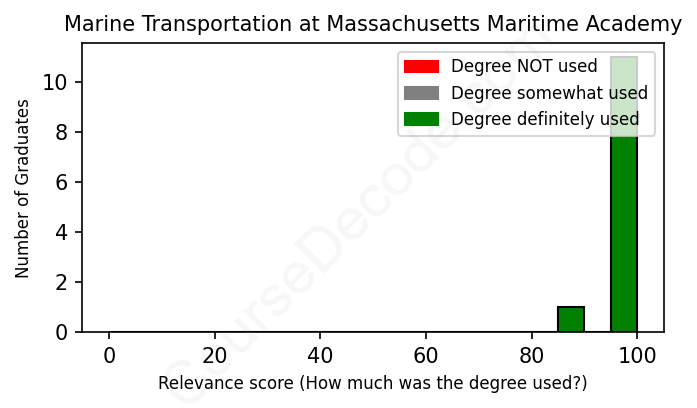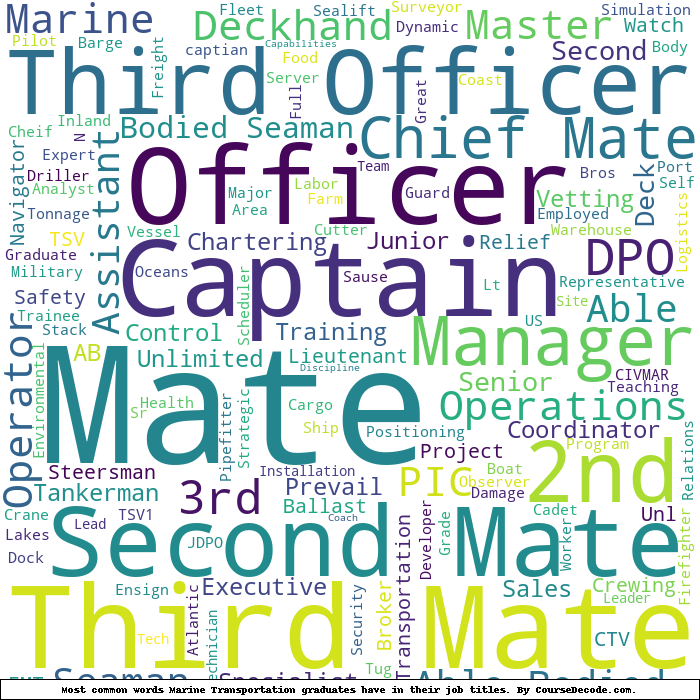
First, some facts. Of the Marine Transportation graduates from Massachusetts Maritime Academy we've analyzed , here's how many have used (or NOT used) their degree in their career:

These are estimates based on AI analysis of 12 LinkedIn profiles (see below).
The verdict? Fantastic! Overall, with an average relevance score of 98%, Marine Transportation graduates from Massachusetts Maritime Academy have an exceptionally higher likelihood (+31%) of finding work in this field compared to the average graduate across all fields:
And for comparison, here's the chart for all profiles we've looked at across all degrees.
Also, after graduating, only 0% of these graduates have pursued further education other than another Bachelor's degree (such as a Masters degree or other), compared to the average across all profiles of 35%. This suggests a Bachelors degree is enough for most Marine Transportation graduates, and it's normal to look for work straight after graduation.
See the details:
|
Relevance score: 97% We think this person has gone into a career highly relevant to their degree. We think this person has gone into a career highly relevant to their degree.
DEGREE INFOGraduated in 2013 from Massachusetts Maritime Academy with a Bachelors of Science in Marine Transportation. No other secondary education since. JOB HISTORY SINCE GRADUATIONSteersman Kirby Inland Marine Aug 2013 - Apr 2015 Tankerman/mate Trainee  Kirby Offshore Marine Apr 2015 - Apr 2017 Captain  Mohawk Northeast, Inc. Sep 2017 - Oct 2018 Tankerman  Reinauer Transportation Companies, LLC Oct 2018 - Feb 2020 2nd mate  Kirby Offshore Marine Feb 2020 - Jun 2023 CTV Mate  Seaward Services Inc. May 2023 - Dec 2023 CTV Captain  Seaward Services Inc. Dec 2023 - Feb 2024 Marine Coordinator  Renewable Strategy Limited Feb 2024 - Present ABOUTExperienced graduate of Massachusetts Maritime Academy with a Bachelors of Science in Marine Transportation, holding licenses including a 1600 ton Master Oceans, 2nd mate unlimited tonnage oceans, and master of towing oceans and western rivers. With a background in operating tugboats across various sizes and horsepower, I've navigated diverse areas including East, West, Gulf Coast, and Mississippi River. My recent roles in the burgeoning offshore wind industry as a CTV Captain and Marine Coordinator on the VW1 wind farm construction project highlight my dedication to vessel operations, marine coordination, and safety management. Skilled in leadership, critical thinking, and effective communication, I excel in navigating complex regulatory landscapes while ensuring compliance with industry standards. With a proven track record of success in coordinating vessel activities and managing emergency responses, I am committed to fostering a culture of safety and driving positive outcomes in the maritime sector. |
The top 10 most common jobs done by the graduates we've analyzed (ranked most common to least) are:
From analyzing the job trajectories of graduates from the Massachusetts Maritime Academy, it’s clear that the majority have secured positions that are tightly woven into the fabric of marine transportation. Roles like Third Mate, Second Mate, Chief Mate, and Captain are the most common and basically scream relevance! These positions typically emphasize strong navigation skills, ship operations, and maritime safety, aligning perfectly with the training these students undergo during their degree program. For example, roles in well-known shipping companies like Maersk and Chevron highlight a clear application of their academic knowledge in real-world maritime contexts, reinforcing the hands-on nature of their education.
However, not every job they took was purely scenic sailing. Some roles, such as Ballast Control Operator or Marine Coordinator, showed a bit of a drift from the pure marine transportation focus. While they might have some marine-related aspects, they don't fully encompass the navigation and maritime operational skills central to the Marine Transportation curriculum. There are even instances of graduates stepping into completely different fields, like software development, which suggests some diversity in career paths. Overall, though, the predominant trend is undeniably toward highly relevant maritime careers, showcasing the strength and applicability of their education in the marine environment.
Here is a visual representation of the most common words in job titles for Marine Transportation graduates (this is across all Marine Transportation graduates we've analyzed, not just those who went to Massachusetts Maritime Academy):

Looking at the career paths of graduates from the Massachusetts Maritime Academy, it seems like most of them stick fairly close to marine transportation after they graduate. Right after finishing their degrees, many jump into roles as third mates or deck officers with various shipping companies, often working their way up through the ranks. For example, graduates from 2010 to 2022 landed initial jobs as third mates at prominent companies like Maersk and Crowley or took roles with major oil and gas corporations like bp. This trend shows a solid start within the industry, which is a good sign for future career growth.
Fast forward five to ten years, and many of these individuals are stepping into higher positions, such as second mates, chief mates, or even captains. A good number of graduates transition into specialized roles, like marine lead technician or ballast control operator, illustrating the versatility of a marine transportation degree. However, there are a few cases where graduates have ventured off into completely different fields, like software development, but these instances seem to be the exception rather than the rule. Overall, alumni from Massachusetts Maritime Academy appear to have found stable and relevant careers within marine transportation, showing that this path can lead to a fulfilling professional life on the water!
Honestly, a Bachelor’s degree in Marine Transportation, especially at a place like Massachusetts Maritime Academy, can be pretty challenging, but that's kind of the point. It’s a blend of technical skills, safety regulations, navigation, and a whole lot of hands-on learning. You’ll be dealing with subjects like engineering principles and maritime law, plus you’ll probably have to spend time at sea on training ships to get that real-world experience, which can be demanding. It’s definitely not an easier path; you’re walking a tough yet rewarding line, so if you're passionate about the ocean and determined to learn, it can be an incredible experience despite the hard work.
Most commonly, in the LinkedIn profiles we've looked at, it takes people 4 years to finish a Bachelor degree in Marine Transportation.
So, if you look at the job paths of these Massachusetts Maritime Academy grads, they seem to be making a decent living overall. Starting from entry-level positions like Third Mate and moving up to roles like Chief Mate and Captain shows a clear progression, which usually comes with better pay. Those working with major companies like Maersk, Chevron, and bp likely enjoy competitive salaries, especially as they climb the ranks. Even if some are still in earlier stages of their careers, they’re gaining valuable experience in a field known for relatively good pay and benefits, especially once you hit the higher ranks. So, yeah, it’s safe to say they’re doing alright financially!
Here is a visual representation of the most common words seen in the "about" section of LinkedIn profiles who have a Bachelor degree in Marine Transportation (this is across all Marine Transportation graduates we've analyzed, not just those who went to Massachusetts Maritime Academy). This may or may not be useful:

Here are all colleges offering a Bachelor degree in Marine Transportation (ordered by the average relevance score of their Marine Transportation graduates, best to worst) where we have analyzed at least 10 of their graduates:
| College | Score | Count |
|---|---|---|
 Massachusetts Maritime Academy Massachusetts Maritime Academy
|
98 | 12 |
 State University of New York Maritime College State University of New York Maritime College
|
80 | 16 |